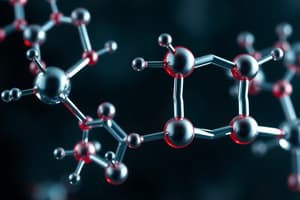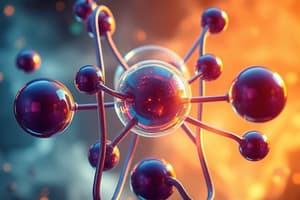Podcast
Questions and Answers
What is the fundamental branch of science that delves into the mysteries of matter and the interactions between atoms and molecules?
What is the fundamental branch of science that delves into the mysteries of matter and the interactions between atoms and molecules?
Chemistry
What is the atomic theory?
What is the atomic theory?
States that all matter is composed of atoms and compounds
What type of bonds result from atoms sharing electrons?
What type of bonds result from atoms sharing electrons?
Covalent bonds
What is the function of the periodic table in chemistry?
What is the function of the periodic table in chemistry?
Signup and view all the answers
What is the unit used to measure the amount of a substance in chemistry?
What is the unit used to measure the amount of a substance in chemistry?
Signup and view all the answers
What drives chemical reactions in chemistry?
What drives chemical reactions in chemistry?
Signup and view all the answers
What is stoichiometry?
What is stoichiometry?
Signup and view all the answers
Define solutions.
Define solutions.
Signup and view all the answers
How do acids and bases react with water?
How do acids and bases react with water?
Signup and view all the answers
What are the three states of matter?
What are the three states of matter?
Signup and view all the answers
Why is the study of thermodynamics important in chemistry?
Why is the study of thermodynamics important in chemistry?
Signup and view all the answers
What is the focus of organic chemistry?
What is the focus of organic chemistry?
Signup and view all the answers
Study Notes
Exploring the Wonders of Science: A Focus on Chemistry
Chemistry, one of the fundamental branches of science, delves into the mysteries of matter and the interactions between atoms and molecules. It's a vibrant field that has transformed our world, from the creation of medicines and materials to the understanding of life itself.
The Atomic World
At the heart of chemistry lies the atomic theory, which states that all matter is composed of atoms and compounds. Each element is made of identical atoms that possess unique properties. For instance, a hydrogen atom, with its single proton and electron, differs from a helium atom, which has two protons, two neutrons, and two electrons.
Bonding and Reactions
The interactions between atoms result in chemical bonds, which hold together molecules. These bonds can be covalent (sharing electrons) or ionic (transfer of electrons between atoms). The formation and breaking of chemical bonds drive chemical reactions, which are the foundation of chemistry.
The Periodic Table
The periodic table is a chart that organizes elements based on their atomic number, electron configuration, and properties. It provides a handy reference for chemists to understand and predict trends in chemical behavior.
The Mole and Stoichiometry
The mole, a unit used to measure the amount of a substance, helps chemists to balance chemical equations and predict the products of reactions. Stoichiometry, the study of the relationships between reactants and products, is a powerful tool in chemistry for solving problems and designing experiments.
Solutions and Solubility
Solutions, which are homogeneous mixtures of solutes and solvents, play a central role in chemistry. The solubility of various substances in different solvents allows chemists to create a wide range of useful preparations.
Acids and Bases
Acids and bases are substances that react with water, forming either hydrogen ions (H⁺) [acids] or hydroxide ions (OH⁻) [bases]. The pH scale, which measures acidity and basicity, is used to quantify the concentration of these ions.
States of Matter
The study of chemistry encompasses the three states of matter: solid, liquid, and gas. Each state has unique physical properties that result from the arrangement of atoms and molecules. For example, solids have a fixed shape and volume, while gases expand to fill a container.
Thermodynamics and Energy
The study of energy and its transformation in chemical reactions is a vital part of chemistry. Chemists use thermodynamics to understand and predict the spontaneity of reactions, as well as the efficiency of energy conversions.
Organic Chemistry
Organic chemistry, one of the most diverse and challenging areas of chemistry, focuses on carbon-based compounds. This field plays a critical role in the development of new materials, drugs, and biochemical processes.
Environmental and Analytical Chemistry
Environmental chemistry and analytical chemistry are two vital subfields of chemistry that focus on understanding and solving environmental problems and developing new analytical techniques. These fields are responsible for tracking pollutants, analyzing water and air quality, and developing methods to clean up contaminated environments.
Chemistry, with its diverse and fascinating subfields, continues to shape our world. By exploring the mysteries of matter and understanding the interactions between atoms and molecules, chemists are pushing the boundaries of human knowledge. Whether it's creating new materials, designing drugs, or better understanding the world around us, chemistry is a force for change and a beacon of curiosity in the pursuit of understanding our universe.
Studying That Suits You
Use AI to generate personalized quizzes and flashcards to suit your learning preferences.
Description
Delve into the wonders of chemistry, exploring the mysteries of matter, atomic structures, chemical bonds, the periodic table, reactions, solutions, states of matter, thermodynamics, organic chemistry, and environmental/analytical chemistry. Discover how chemists use their knowledge to create new materials, design drugs, and solve environmental challenges.




